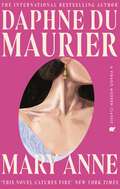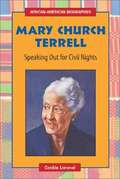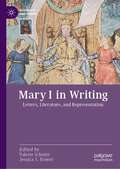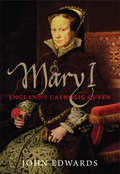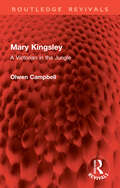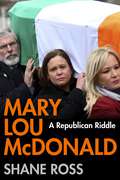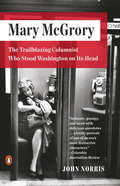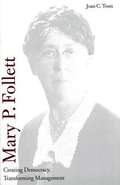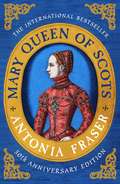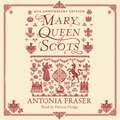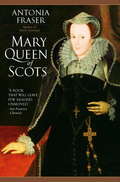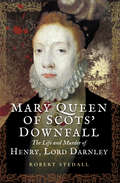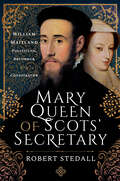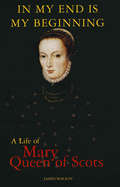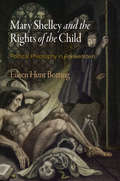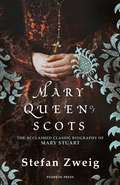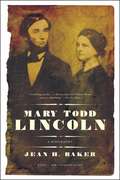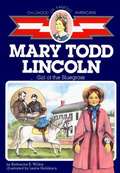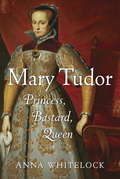- Table View
- List View
Mary Anne (Virago Modern Classics #118)
by Daphne Du Maurier'She wrote exciting plots, she was highly skilled at arousing suspense' GUARDIAN 'This novel catches fire' NEW YORK TIMES 'With unfailing du Maurier skill, the author has coupled family interest with dramatic sense' ELIZABETH BOWENShe set men's hearts on fire and scandalized a country. In Regency London, the only way for a woman to succeed is to beat men at their own game. So when Mary Anne Clarke seeks an escape from her squalid surroundings in Bowling Inn Alley, she ventures first into the scurrilous world of the pamphleteers. Her personal charms are such, however, before long she is noticed by the Duke of York.With her taste for luxury and power, Mary Anne, now a royal mistress, must aim higher. Her lofty connections allow her to establish a thriving trade in military commissions, provoking a scandal that rocks the government and brings personal disgrace.A vivid portrait of overweening ambition, Mary Anne is set during the Napoleonic Wars and based on the life of du Maurier's own great-great-grandmother.
Mary Anne (Vmc Ser. #519)
by Daphne du MaurierA vivid portrait of overweening ambition set during the Napoleonic Wars and based on du Maurier's own great-great-grandmother.
Mary Church Terrell: Speaking Out for Civil Rights
by Cookie LommelThroughout her long life, Mary Church Terrell never let any obstacle block her path. At age 86, she led a successful battle to integrate the restaurants of Washington, D.C. This was one more link in a lifelong chain of fights and firsts for this outspoken African-American woman. Terrell was one of the first black women in the United States to earn a college degree, the first to be appointed to a school board, the first president of the National Association of Colored Women (NACW), and a founder of the NAACP. In a narrative brimming with true stories, author Cookie Lommel introduces readers to the extraordinary activist who helped set a new course for blacks and women in the United States.
Mary I
by Sarah DuncanThis book explores the gender politics of the reign of Mary I of England from her coronation to her funeral and examines the ways in which the queen and her supporters used language, royal ceremonies, and images to bolster her right to rule and define her image as queen.
Mary I in Writing: Letters, Literature, and Representation (Queenship and Power)
by Valerie Schutte Jessica S. HowerThis book—along with its companion volume Writing Mary I: History, Historiography, and Fiction—centers on representations of Queen Mary I in writing, broadly construed, and the process of writing that queen into literature and other textual sources. It spans an equally wide chronological and geographical scope, accounting for the years prior to her accession in July 1553 through the centuries that followed her death in November 1558 and for her reach across England, and into Ireland, Spain, Italy, Russia, and Africa. Its intent is to foreground words and language—written, spoken, and acted out—and, by extension, to draw out matters of and conversations about rhetoric, imagery, methodology, source base, genre, narrative, form, and more. Taken together, these two volumes find in England’s first crowned queen regnant an incomparable opportunity to ask new questions and seek new answers that deepen our understanding of queenship, the early modern era, and modern popular culture.
Mary I: England's Catholic Queen
by John EdwardsThe lifestory of Mary I--daughter of Henry VIII and his Spanish wife, Catherine of Aragon--is often distilled to a few dramatic episodes: her victory over the attempted coup by Lady Jane Grey, the imprisonment of her half-sister Elizabeth, the bloody burning of Protestants, her short marriage to Philip of Spain. This original and deeply researched biography paints a far more detailed portrait of Mary and offers a fresh understanding of her religious faith and policies as well as her historical significance in England and beyond. John Edwards, a leading scholar of English and Spanish history, is the first to make full use of Continental archives in this context, especially Spanish ones, to demonstrate how Mary's culture, Catholic faith, and politics were thoroughly Spanish. Edwards begins with Mary's origins, follows her as she battles her increasingly erratic father, and focuses particular attention on her notorious religious policies, some of which went horribly wrong from her point of view. The book concludes with a consideration of Mary's five-year reign and the frustrations that plagued her final years. Childless, ill, deserted by her husband, Mary died in the full knowledge that her Protestant half-sister Elizabeth would undo her religious work and, without acknowledging her sister, would reap the benefits of Mary's achievements in government.
Mary I: The Daughter of Time (Penguin Monarchs)
by John EdwardsThe elder daughter of Henry VIII, Mary I (1553-58) became England's ruler on the unexpected death of her brother Edward VI. Her short reign is one of the great potential turning points in the country's history. As a convinced Catholic and the wife of Philip II, king of Spain and the most powerful of all European monarchs, Mary could have completely changed her country's orbit, making it a province of the Habsburg Empire and obedient again to Rome. These extraordinary possibilities are fully dramatized in John Edward's superb short biography. The real Mary I has almost disappeared under the great mass of Protestant propaganda that buried her reputation during her younger sister, Elizabeth I's reign. But what if she had succeeded?
Mary Kingsley: A Victorian in the Jungle (Routledge Revivals)
by Olwen CampbellThe name of Mary Kingsley deserves to be more widely known than it is today. A woman of rare abilities and boundless courage, living in an age when the narrowest Victorian conventions about the duties of daughters in the home still prevailed, she nevertheless achieved fame and distinction as a traveller in the wildest regions of West Africa, a writer, an ethnologist, and an expert on Colonial Government.As a young woman, Mary Kingsley had no life beyond the strict confines of her home; not until 1892, when she was thirty, did freedom come to her. Instantly this astonishing young woman began the work, which was to lead her to remote, unexplored regions of ‘the Coast’. Along unmapped rivers, to a study of cannibals, and in England, to a political struggle to which she wholeheartedly gave herself for the welfare of the peoples of West Africa, until her death in 1900.In vivid, discursive travel books, Mary Kingsley described her experiences with immense detachment and humour. These lengthy works have long been out of print, but in Mary Kingsley: A Victorian in the Jungle (first published in 1957.) Olwen Campbell, by presenting selected extracts, preserves in a concise form the record of these strange adventures. But the adventures themselves are only a part of a remarkable life story. The effects on Mary Kingsley’s character of her oppressive home life are fully brought out for the first time, and some explanation is suggested of a most enigmatic personality. Fresh light is also thrown on her political work, and her character, by a number of extracts from a series of remarkable letters, never before published.
Mary Lou McDonald: A Republican Riddle
by Shane RossA biography of the Sinn Fé in leader, and Taoiseach in waiting, Mary Lou McDonald.Mary Lou McDonald is the bookies' favourite to be Ireland's next Taoiseach. She would be the first woman to reach the office, and the first Sinn Fé in leader ever to enter government in the Republic of Ireland. But how did a quintessentially bourgeois woman end up as the leader of a political party with such a recent terrorist past? And was her change of allegiance from Fianna Fá il to Sinn Fé in ideological or opportunistic?Shane Ross's scrupulously fair and balanced biography illuminates McDonald's political awakening, her relationship with the hard men of the IRA, and the evolution and future of Sinn Fé in.
Mary McGrory
by John NorrisA wildly entertaining biography of the trailblazing Washington columnist and the first woman to win the Pulitzer Prize for commentary Before there was Maureen Dowd or Gail Collins or Molly Ivins, there was Mary McGrory. She was a trailblazing columnist who achieved national syndication and reported from the front lines of American politics for five decades. From her first assignment reporting on the Army-McCarthy hearings to her Pulitzer-winning coverage of Watergate and controversial observations of President Bush after September 11, McGrory humanized the players on the great national stage while establishing herself as a uniquely influential voice. Behind the scenes she flirted, drank, cajoled, and jousted with the most important figures in American life, breaking all the rules in the journalism textbook. Her writing was admired and feared by such notables as Lyndon Johnson (who also tried to seduce her) and her friend Bobby Kennedy who observed, "Mary is so gentle--until she gets behind a typewriter." Her soirees, filled with Supreme Court justices, senators, interns, and copy boys alike, were legendary. As the red-hot center of the Beltway in a time when the newsrooms were dominated by men, McGrory makes for a powerfully engrossing subject. Laced with juicy gossip and McGrory's own acerbic wit, John Norris's colorful biography reads like an insider's view of latter-day American history--and one of its most enduring characters.
Mary P. Follett: Creating Democracy, Transforming Management
by Joan C. TonnMary P. Follett (1868-1933) brought new dimensions to the theory and practice of management and was one of America's preeminent thinkers about democracy and social organization. The ideas Follett developed in the early twentieth century continue even today to challenge thinking about business and civic concerns. This book, the first biography of Follett, illuminates the life of this intriguing woman and reveals how she devised her farsighted theories about the organization of human relations. --BOOK JACKET. Title Summary field provided by Blackwell North America, Inc. All Rights Reserved
Mary Queen Of Scots
by Antonia Fraser'Ground-breaking ... One of the greatest international bestsellers of the post-war period' Andrew Roberts, Daily Telegraph'Reads like an engrossing novel' Sunday TimesAn infant queen. A teenage widow. Beautiful, flamboyant Mary Queen of Scots had a formidable intellect but her political sense - formed at the absolute court of France - plunged her country into a maelstrom of intrigue, marriage and murder. Upon fleeing to England she was held captive by her cousin Elizabeth I. In this classic biography, reissued for the fiftieth anniversary of its publication, acclaimed historian Antonia Fraser relates the enthralling story of Mary's life and untimely end.
Mary Queen Of Scots
by Lady Antonia FraserMary Queen of Scots passed her childhood in France and married the Dauphin to become Queen of France at the age of sixteen. Widowed less than two years later, she returned to Scotland as Queen after an absence of thirteen years.Her life then entered its best known phase: the early struggles with John Knox, and the unruly Scottish nobility; the fatal marriage to Darnley and his mysterious death; her marriage to Bothwell, the chief suspect, that led directly to her long English captivity at the hands of Queen Elizabeth; the poignant and extraordinary story of her long imprisonment that ended with the labyrinthine Babington plot to free her, and her execution at the age of forty-four.Read by Patricia Hodge(p) 2002 Orion Publishing Group
Mary Queen of Scots
by Antonia FraserShe was the quintessential queen: statuesque, regal, dazzlingly beautiful. Her royal birth gave her claim to the thrones of two nations; her marriage to the young French dauphin promised to place a third glorious crown on her noble head.<P> Instead, Mary Stuart became the victim of her own impulsive heart, scandalizing her world with a foolish passion that would lead to abduction, rape and even murder. Betrayed by those she most trusted, she would be lured into a deadly game of power, only to lose to her envious and unforgiving cousin, Elizabeth I. Here is her story, a queen who lost a throne for love, a monarch pampered and adored even as she was led to her beheading, the unforgettable woman who became a legend for all time.
Mary Queen of Scots
by Antonia FraserMary Queen of Scots passed her childhood in France and married the Dauphin to become Queen of France at the age of sixteen. Widowed less than two years later, she returned to Scotland as Queen after an absence of thirteen years.
Mary Queen of Scots' Downfall: The Life and Murder of Henry, Lord Darnley
by Robert StedallThe story of the Scottish ruler—and the mysterious death of her ambitious and controversial husband. In the early hours of February 10, 1567, a large explosion ripped through the lodgings at Kirk o&’ Field, Edinburgh, where Mary Queen of Scotland&’s consort, Henry, Lord Darnley, was staying. Darnley&’s body was found with that of his valet in a neighboring garden the next morning. The queen&’s husband had been murdered—and the ramifications for Mary and Scottish history would be far-reaching. Lord Darnley cuts an infamous figure in Scottish and Tudor history. In life, he proved a controversial character, and his murder at Kirk o&’ Field remains one of British history&’s great unsolved mysteries—the question of whether Mary was implicated has taxed historians ever since. In this engaging and well-researched biography, Robert Stedall reexamines Darnley&’s life and his death. His investigation brings new light and compelling conclusions to a story surrounded by political betrayal, murder, falsified evidence, and conspiracy.
Mary Queen of Scots' Secretary: William Maitland—Politician, Reformer and Conspirator
by Robert Stedall“It’s as good as a Philippa Gregory, and tells you so much more about Mary Queen of Scots and the people with whom she surrounded herself.” —Books MonthlyWilliam Maitland of Lethington was the most able politician and diplomat during the lifetime of Mary Queen of Scots. It was he who masterminded the Scottish Reformation by breaking the ‘Auld Alliance’ with France, which presaged Scotland’s lasting union with England.Although he gained English support to defeat French troops defending Mary’s Scottish throne, he backed her return to Scotland, as the widowed Queen of France. His attempts to gain recognition for her as heir to the English crown were thwarted by her determined adherence to Catholicism.After her remarriage, he spearheaded the plotting to bring down her objectionable husband, Lord Darnley, leading to his murder, after concluding that English and Scottish interests were best served by creating a Protestant regency for their son, Prince James. With encouragement from Cecil in England and the Protestant Lords in Scotland, he concocted evidence to implicate her in her husband’s murder, resulting in her imprisonment and deposition from the Scottish throne.This is the thrilling biography of a complicated man whose loyalty wavered between queen and country and whose behind-the-throne machinations may have caused her undoing—and his own . . . “A modern, convincing—I must also use that popular buzzword ‘game-changing’—biography that combines page-turning narrative with convincing, sophisticated, scholarly argument.” —Steven Veerapen, Professor of History, Strathclyde University
Mary Queen of Scots: In My End is My Beginning
by Dr James MackayIn My End Is My Beginning is the story of Mary Queen of Scots (1542–87), the tragic heroine par excellence. Queen of an unfamiliar and troubled nation when she was a week old, it was her misfortune to be a pawn in the game of international politics throughout her life. Even in the brief period from 1561 to 1567 when she was ruler of Scotland in fact as well as in name, she was beset with problems that would have defeated a much stronger, more experienced monarch. A talented poet and a charismatic leader, she contended with a treacherous, self-serving nobility, the religious ferment of the Reformation, and the political ambitions of larger and more powerful neighbours. With little real authority and few resources, Mary’s reign was successful, until her disastrous marriage to the dissolute Darnley set in motion the events that brought about her downfall. For the last 20 years of her life she was a prisoner in the hands of her cousin, Elizabeth I of England, and the subject of treacherous plots and conspiracies. A hostage to fortune, she represented a threat and a rallying-point for English Catholics. Her tragic end was inevitable. Yet her life, with all its adventurous, failures and disasters, produced the son – James – who ultimately brought about the union of Scotland and England.In the End Is My Beginning uncovers the true facts of Mary’s life in the context of Anglo-Scottish relations and shows why, after more than 400 years, she remains arguably the greatest character in popular Scottish history.
Mary Shelley and the Rights of the Child: Political Philosophy in "Frankenstein"
by Eileen Hunt BottingFrom her youth, Mary Shelley immersed herself in the social contract tradition, particularly the educational and political theories of John Locke and Jean-Jacques Rousseau, as well as the radical philosophies of her parents, the feminist Mary Wollstonecraft and the anarchist William Godwin. Against this background, Shelley wrote Frankenstein; or, the Modern Prometheus, first published in 1818. In the two centuries since, her masterpiece has been celebrated as a Gothic classic and its symbolic resonance has driven the global success of its publication, translation, and adaptation in theater, film, art, and literature. However, in Mary Shelley and the Rights of the Child, Eileen Hunt Botting argues that Frankenstein is more than an original and paradigmatic work of science fiction—it is a profound reflection on a radical moral and political question: do children have rights?Botting contends that Frankenstein invites its readers to reason through the ethical consequences of a counterfactual premise: what if a man had used science to create a human life without a woman? Immediately after the Creature's "birth," his scientist-father abandons him and the unjust and tragic consequences that follow form the basis of Frankenstein's plot. Botting finds in the novel's narrative structure a series of interconnected thought experiments that reveal how Shelley viewed Frankenstein's Creature for what he really was—a stateless orphan abandoned by family, abused by society, and ignored by law. The novel, therefore, compels readers to consider whether children have the right to the fundamental means for their development as humans—namely, rights to food, clothing, shelter, care, love, education, and community.In Botting's analysis, Frankenstein emerges as a conceptual resource for exploring the rights of children today, especially those who are disabled, stateless, or genetically modified by medical technologies such as three-parent in vitro fertilization and, perhaps in the near future, gene editing. Mary Shelley and the Rights of the Child concludes that the right to share love and community, especially with parents or fitting substitutes, belongs to all children, regardless of their genesis, membership, or social status.
Mary Stuart
by Eden Paul Cedar Paul Stefan ZweigMary Stuart Queen of Scots, Queen of France and a claimant to the throne of England, was condemned for treason and executed at the age of forty-four. A potential threat to the stability of the English Crown, she was held captive for twenty years by her cousin Elizabeth I, Queen of England. From the moment of her birth until her execution, her life was spent embroiled in the power struggles that shook the foundations of Renaissance Europe.It has taken the free spirit and the immense talent of Stefan Zweig to justly reconstruct events in the life of a woman who was so cruelly united with destiny. With all the rigor of a scientist and the passion of an artist, Zweig has skillfully reconstituted the character of Mary Stuart and the turmoil that was her fate.
Mary Todd Lincoln: A Biography
by Jean M. BakerA privileged daughter of the proud clan that founded Lexington, Kentucky, Mary Todd (1818-1882) was raised in a world of frontier violence. Subjected to her first abandonment at age six when her mother died, Mary later fled a hostile stepmother for Springfield, where she met and, after a stormy romance, married the raw Illinois attorney, Abraham Lincoln. For twenty-five years the Lincolns forged opposing temperaments into a tolerant, loving marriage. Mary was at her husband's side on the night of his assassination, and never recovered from that greatest in a series of grievous abandonments. The desperate measures she took to win the acknowledgment she sought all her life led finally to the shock of a public insanity hearing instigated by her eldest son. In this elegant biography, Jean Baker uses previously untapped letters and documents to portray a woman whose will carried her across the recognized boundaries of female behavior.
Mary Todd Lincoln: Girl of the Bluegrass
by Katharine E. WilkieA biography concentrating on the childhood of the Kentucky girl who grew up to marry Abraham Lincoln.
Mary Tudor
by Anna WhitelockShe was the first woman to inherit the throne of England, a key player in one of Britain's stormiest eras, and a leader whose unwavering faith and swift retribution earned her the nickname "Bloody Mary." Now, in this impassioned and absorbing debut, historian Anna Whitelock offers a modern perspective on Mary Tudor and sets the record straight once and for all on one of history's most compelling and maligned rulers. Though often overshadowed by her long-reigning sister, Elizabeth I, Mary lived a life full of defiance, despair, and triumph. Born the daughter of the notorious King Henry VIII and the Spanish Katherine of Aragon, young Mary was a princess in every sense of the word--schooled in regal customs, educated by the best scholars, coveted by European royalty, and betrothed before she had reached the age of three. Yet in a decade's time, in the wake of King Henry's break with the pope, she was declared a bastard, disinherited, and demoted from "princess" to "lady." Ever her deeply devout mother's daughter, Mary refused to accept her new status or to recognize Henry's new wife, Anne Boleyn, as queen. The fallout with her father and his counselors nearly destroyed the teenage Mary, who faced imprisonment and even death. It would be an outright battle for Mary to work herself back into the king's favor, claim her rightful place in the Tudor line, and ultimately become queen of England, but her coronation would not end her struggles. She flouted the opposition and married Philip of Spain, sought to restore Catholicism to the nation, and fiercely punished the resistance. But beneath her brave and regal exterior was a dependent woman prone to anxiety, whose private traumas of phantom pregnancies, debilitating illnesses, and unrequited love played out in the public glare of the fickle court. Anna Whitelock, an acclaimed young British historian, chronicles this unique woman's life from her beginnings as a heralded princess to her rivalry with her sister to her ascent as ruler. In brilliant detail, Whitelock reveals that Mary Tudor was not the weak-willed failure as so often rendered by traditional narratives but a complex figure of immense courage, determination, and humanity.
